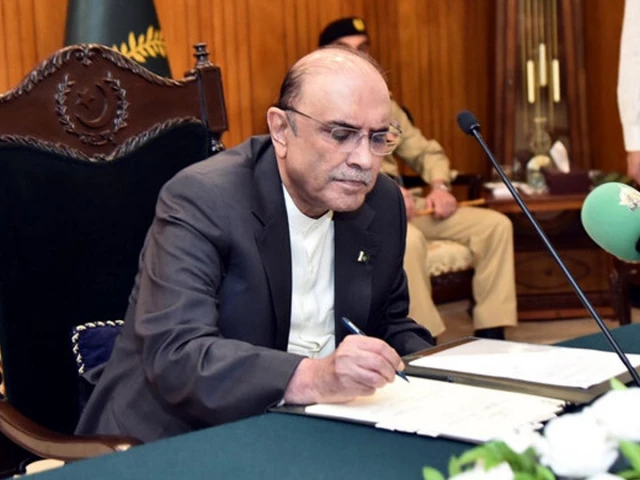The head of the army will become CDF, the CJCSC abolished and the CNSC appointed for a 3-year term with the approval of the Prime Minister
President Asif Ali Zardari. Photo: PID
President Asif Ali Zardari has signed three laws relating to Pakistan’s armed forces, passed by both houses of Parliament under the 27th Constitutional Amendment.
The President gave his assent to the Pakistan Army (Amendment) Bill 2025, the Pakistan Air Force (Amendment) Bill 2025 and the Pakistan Navy (Amendment) Bill 2025, making them Acts of Parliament.
مملکت آصف علی زرداری نے پاکستان آرمی (ترمیمی) by 2025, پاکستان ایئر فورس (ترمیمی) for 2025 اور پاکستان نیوی (ترمیمی) for 2025 کی منظوری دے دی ہے۔@AAliZardari pic.twitter.com/7qDI2SAtjc
– PPP (@MediaCellPPP) November 15, 2025
Read: COAS Asim Munir to serve five years as CDF
Under the amendments to the Army Act, the Army Chief will also perform the functions of the Chief of Defense Forces (CDF). The mandate of the CDF will begin from the date of official notification. If a general is promoted to marshal, he will serve under Subsection 2. The federal government will determine the duties and responsibilities of the Chief of the Army/CDF.
The bill abolishes the post of Chairman of the Joint Chiefs of Staff Committee (JCSC) with effect from November 27, 2025. On the recommendation of the Chief of Army/CDF, the Prime Minister will appoint the Commander of the National Strategic Command (NSCC) for a term of three years and fix the rules and conditions of the post. Renewal of the term for an additional three years is permitted on the recommendation of the CDF, and such extensions cannot be challenged in court.
Learn more: COAS Asim Munir’s tenure to be reset after military command reforms
The amendments further state that the provisions relating to retirement age, length of service and dismissal under the Army Act will not apply to the CNSC, who will continue to serve in the Pakistan Army in the rank of general.
The 27th Constitutional Amendment represents a significant overhaul of Pakistan’s military command structure, redefining the hierarchy and responsibilities of the top military leaders.
The reforms aim to streamline decision-making, integrate multi-domain operations within the armed forces and strengthen coordination between the army, navy and air force. These changes follow years of debate over civil-military relations and are part of a broader context aimed at modernizing Pakistan’s defense framework.
These changes centralize operational authority within the CDF while strengthening the role of the Prime Minister in appointments, reflecting a major restructuring of Pakistan’s military command hierarchy under the 27th Constitutional Amendment.




